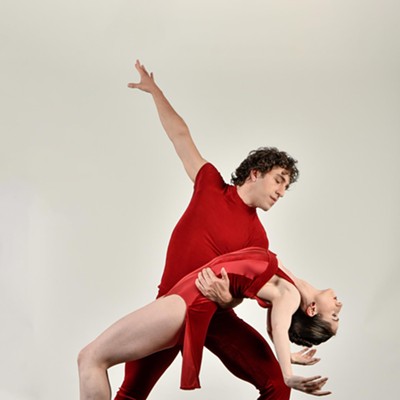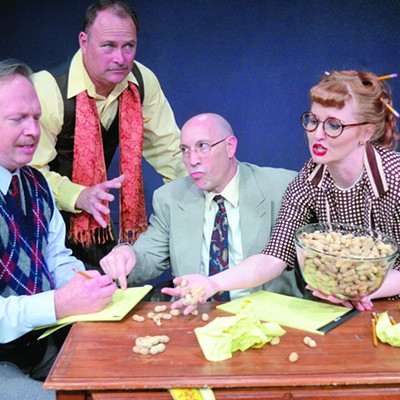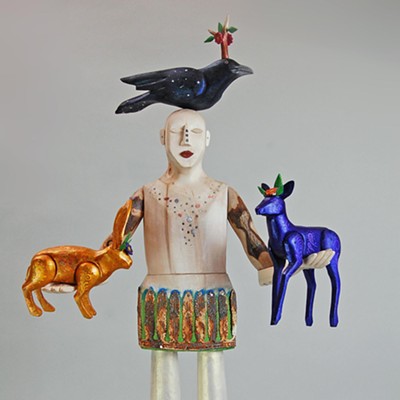A Man in Exile
Norman Finkelstein Lectures on the Israel/Palestine Conflict7 p.m., Monday, May 5
UA Aerospace and Mechanical Engineering Auditorium
Northeast corner of Speedway Boulevard and Mountain Avenue
622-6419
Norman Finkelstein wouldn't hire himself. The 54-year-old says he's finished in academia and probably couldn't get a job at the local post office, simply because employers fear the adage: "Where there's smoke, there's fire."
The smoke that Finkelstein refers to is his tenure rejection at DePaul University. After six years of sufficient annual evaluations, the university informed Finkelstein that he did not meet the standards of civility toward individuals at DePaul, which became the grounds for his rejection, he says.
"It was a complete breach of the tenure process," he says.
The story picked up national attention when a New York Times piece questioned whether outside influences played a role in denying Finkelstein tenure, because of his anti-Zionist beliefs. The university, however, denied such claims.
Since then, Finkelstein has turned his back on academia and is focusing on producing literature regarding the Israeli-Palestinian conflict, as well as lecturing across the nation.
Finkelstein plans on traveling to the "occupied territories" at the end of May, and as he travels the United States giving lectures (like the one coming up at the UA next Monday), the topic has ever-increasing importance.
Most recently, Jimmy Carter led talks with Hamas and Syria, and President George W. Bush hopes to resolve some of the disputes by the end of his term.
"With all due respect to Carter, I respect what he's doing, but some of his claims aren't really accurate," Finkelstein says. He refutes Carter's emphasis on Hamas and discusses Israel's interpretation of a U.S. intelligence report that claimed Iran stopped its nuclear-weapons program in 2003.
"The whole world wants peace; Israel wants war," he says.
The event is free. --M.K.
All Percussion, All the Time
Crosstalk Celebrates its 10th Anniversary7:30 p.m., Sunday, May 4
UA Crowder Hall
Speedway Boulevard and Park Avenue
621-2998; crosstalk.arizona.edu
Saxophones, an upright bass, blips of noise, a synthesizer--all of these sounds are housed in CrossTalk's electronic percussion gear. It's the job of the group's nine members to pound away at the drum kits and controllers to assemble a cohesive piece of music.
At times, the group creates pop music or jazz that follows more structured rules and familiar instruments--but the group does have a flair for experimenting.
The seven UA music students in the collective are encouraged to explore their sensibilities by creating unique sounds, says Norman Weinberg, one of two faculty members in CrossTalk. That type of exploration keeps CrossTalk among a small, unique group of musicians focused on electronics, Weinberg says.
"It was really the first group of its kind," he says. "And it's still kind of the only group doing what they're doing."
For their 10th anniversary performance, CrossTalk will combine Weinberg's original work with pieces from other established artists. Guest performers, such as violinist Mark Rush and guitarist Bob Russell, will help out on some of the pieces.
And before the music is played, CrossTalk members will take the time to give a small history of their work and let the audience know what will happen onstage.
"Typically, the audience can associate a sound with an instrument and identify it, but it's more difficult in this, so we let the audience know which instrument is making which sound," Weinberg says.
Even with the guidance, Weinberg says, a little game between the performers and the audience ensues, as the attendees try to match up what they are hearing with what they are seeing.
The event is free. --M.K.
Fun With Musical Definitions
Tucson Folk FestivalNoon to 10 P.M., Saturday, May 3; 11 a.M. to 9 P.M., Sunday, May 4
Various downtown locations
792-6481; tkma.org
Those creating the schedule for the Tucson Folk Festival have been forced into the difficult business of deciding what exactly constitutes "folk" music.
Susan Liechti, the new president of the Tucson Kitchen Musicians Association, which organizes the annual festival, explains: "We define it as anything that is acoustic music. ... There's the '60s idea of folk, but also traditional ethnic music and others." Liechti freely admits that definitions vary widely.
Singer-songwriter Ruthie Foster offers one voice of dissent: "I don't agree with that. Folk music in the beginning was about getting the message out, having something to say. ... Extend that (idea) more, and certain hip-hop songs can be called folk."
Foster, one of this year's festival headliners, is touring in support of her album The Phenomenal Ruthie Foster. The record has a more plugged-in instrumentation and sound than her previous efforts, and she views the move as an extension of what came before. "There are still elements of folk in the CD. ... People may not call it acoustic, but to me, (folk) is just about showing who you are in your music, having a message sometimes. And sometimes, it's just putting who you are out there."
In addition to folk and soul, Foster finds inspiration in poetry, another art form that couples social messages with personal exploration. Phenomenal derives its title from a Maya Angelou poem. When I phoned Foster at her hotel, she told me she'd just received flowers from Angelou: "I grinned like a chicken when I saw her card."
Ruthie Foster takes the Plaza Stage at 8 p.m., Sunday, May 4. Visit the TKMA Web site for a full festival schedule. --A.M.
The Womanly Arts
Drawing Down the Muse Reception7 to 10 p.m., Saturday, May 3
Womankraft
388 S. Stone Ave.
629-9976; womankraft.org
The women behind WomanKraft, a collective of mostly female artists, are hosting a reception to show work produced during their spring Drawing Down the Muse workshops.
The workshops combine art with craft, meditation, poetry and more. WomanKraft offers these classes free of charge to anyone older than 50; they're moderately priced for everyone else. This practice creates a strong community spirit, says Lilla Luoma, a participating artist. "It's a very supportive environment."
Luoma has helped teach the workshops for the last three years. Four of her paintings--monoprints rendered in an abstract style--will be on display at the reception, along with hand-died silk shawls and jackets, and other "wearable art." Clothes-making, an art often thought of as womanly, isn't seen by the organization as sexist or confining--rather, they embrace such trappings as part of what it means to be a woman.
"We have a desire to articulate and celebrate the values women hold in our culture," says art gallery administrator Linn Lane, "what is important to us, nurturing people instead of cutting them down, peace instead of war."
WomanKraft was formed in the '70s as a way to "claim, validate and empower women artists," a group that was underrepresented in the art world at the time. While women are still underrepresented, things have gotten a lot better, says Lane. For this reason, WomanKraft has broadened the interpretation of its mission, and the programs and events are no longer targeted solely at women, with the exception of Drawing Down the Muse.
The reception will include a group drum performance. Admission is free and open to the public, regardless of gender. The exhibit will be on display through May 31. --A.M.







